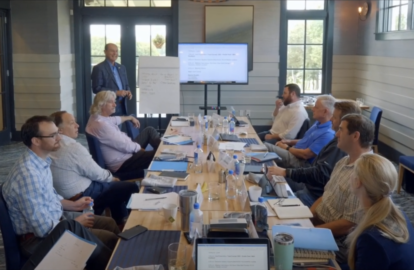“Try never to be the smartest person in the room.” Michael Dell
Fallacies and falsehoods prevent leaders from becoming their best, most effective selves. None is as ingrained – or as dangerous – as the belief that CEOs need to be the smartest people in the room.
Executives have to make the tough calls. They have to make them quickly and decisively, and they have to make them knowing that the consequences fall squarely on their shoulders. But they do not have to make them without input, guidance, and support from people who are…smarter. More experienced. More objective. If you’re the smartest person in the room, find a different room. And don’t let common Vistage misconceptions keep you from entering it and taking a seat at the table.
Unlocking the Value of Peer Support
Often, mistaken assumptions stop leaders from tapping into resources that can benefit their organizations. In the case of Vistage, mistaken assumptions can stop you from accessing help that can benefit your organization, your career, and your personal life – unless you are aware of them.
Misconception #1: So, Vistage is new?
Some leaders are taken aback that this “venerable” peer group has only been in existence since 2006. Not quite: Vistage was founded in 1957 under the name “The Executive Committee,” or TEC. Businessman Robert Nourse got a few CEO friends together to share their experience and war stories because it was difficult to do so within one’s own organization. These noncompeting members could discuss issues freely and without fear of compromising themselves. That was the bedrock of TEC, and it remains the unshakeable foundation of Vistage.
The misconception is understandable: many people don’t realize TEC is Vistage – the name of which is an amalgamation of “vista” (long range view, perspective) and “advantage.”
Misconception #2: So, this is like a lunch and learn?
In the sense that you learn and that you can, in fact, eat lunch, yes! In all other senses, no. Vistage groups meet from 8:00am to 5:00pm once per month.
Vistage is a commitment. While life happens – and a wedding, anniversary, or important family event understandably conflicts with meetings – overall, members make time in their busy schedules to meet with their peers. They are serious, they are dedicated, and they are invested. They know that one nine-hour day (yes, including lunch) makes a significant difference in their leadership – and in their lives.
Misconception #3: Not a lunch and learn…so it’s like the Chamber of Commerce?
Belonging to the Chamber of Commerce can be an exceptional business-building opportunity. Owners and leaders join to develop their organizations, generate new leads, and network with potential partners, vendors, or suppliers. It’s a critical service to members, and, as essentially, to their communities.
Vistage offers a different type of service: you do not come to meetings to hand out your business cards. You come to learn, to teach your peers, to work with them to solve issues, overcome challenges, and discuss possibilities. You come to grow as a leader – and as a person.
Misconception #4: Vistage seems more expensive than other groups.
This may not be a misconception – at least on the face of it. There is a one-time enrollment fee and monthly dues, and this may be more spendy than other peer or advisory groups. But most other peer groups do not offer intensive day-long meetings. Most other peer groups don’t offer one to one sessions with a dedicated chair. Most other peer groups don’t have 20,000 members and 1500 speakers from whom they can draw in-depth expertise, insight, and advice. Most other peer groups don’t have facilitators who train continuously so they can provide their members with the most positive, growth-enhancing experience.
And most other peer groups cannot say that their members grew their companies at three times the rate of their counterparts. It all comes down to value, and Vistage provides it in spades.
Misconception #5: You don’t seem to have high-profile members.
Some peer groups treat their membership base as a marketing tool. While there is nothing wrong with that, Vistage takes the privacy of its members seriously. You’re not there to be featured in a brochure or to serve as a promotional tool; you are there to learn. Oftentimes, that process is exceedingly private and personal.
Misconception #6: Every meeting is the same.
Every Vistage chair receives training, and it is ongoing and intensive. Chairs, like members, discuss issues and opportunities, while exploring avenues towards growth and improvement. But, and this is a significant but, every chair brings a different background, set of experiences, skills, and insights to his or her group. This adds a rich and diverse perspective from which members can benefit.
And many chairs work diligently to facilitate diverse experiences within their meetings. For example, in some groups, members take turns hosting meetings. This allows the other members to see the host’s work environment. What is the atmosphere? What are the people like? What are the issues – up close and personal?
Some members are apprehensive: what if I’m a solopreneur renting small offices? What if I didn’t have the capacity to host 15 people? Not to worry. A local restaurant is fine. A hotel conference room is fine. A golf course… a golf course is great, and the scenery is wonderful. The point is to take other members deeper into the issues so they can offer better advice and guidance – and so they can learn more.
Remember, you’re the host – not the facilitator. You’ve got enough on your plate. Your Vistage Chair will conduct the meeting so you can focus on the learning.
Misconception #7: I’d just scratch the surface of my business needs and not gain anything of significant value.
“I need to fire my VP of sales. He’s my brother-in-law.”
Many executive groups do not allow members to broach personal topics. But that negates the value of belonging to a peer group. Vistage doesn’t just allow personal discussions; it encourages them by creating a safe, noncompetitive environment.
In one case, a CEO needed to fire his VP of sales. They had been working together from the beginning. After 15 years, from startup to $15 million, the leader realized that his VP wasn’t growing with the company. The member is a CEO; he’s surely had experience firing people. But not his brother-in-law, and not without talking to his wife.
That’s the problem; it’s not letting the employee go, though that’s difficult. It’s how to do that when there are deeply personal entanglements. With Vistage, you can talk about the issues that make business decisions harder.
When members start in a Vistage group, they typically deal with “head,” or intellectual issues: my revenue is down 2%. That feels safe. Eventually, they are comfortable enough to talk about “heart” issues, about the matters that are important to them. When Vistage provides the most value is when members speak from the gut. What’s in your gut? What do your really think about this? What’s the best way to handle this?
When a member is fully engaged – mind, heart, and gut – that’s when he or she derives the most value from Vistage. And that’s when their group mates realize the value for which they are searching.
This is why Vistage members stay with their groups for an average of seven to ten years. They find their room, the room with smart people who enable them to put every issue on the table.
Every Vistage meeting has an agenda – but no Vistage member has an agenda. The goal is always to learn and to provide others with the benefit of your knowledge.
Misconception #8: I hear it’s just a group of old white guys.
Vistage members come from all walks of life. When you walk into a group, you’ll see a 30- year old CEO sitting beside a CEO with 30 years of experience. You will see women and men. You will see different ethnicities and socio-economic backgrounds. You will see high school graduates and those with doctorates, and presidents of $4 million companies as well as $650 million corporations.
Most importantly, what you will see is a group of learners who are striving to grow and develop, to advise and to listen.
Misconception #9: It’s pronounced Vis-TAHGE, right?
It’s Vis-TIGE. And it is the room in which you will find the insight, advice, and intelligence you need to take your organization, your career, and your life to the next level.
If you’re the smartest one in the room, it’s time to surround yourself with different people. Vistage empowers you to learn, share, and grow in a safe, confidential environment. Open that door and realize the benefits for your business, career, and life.


